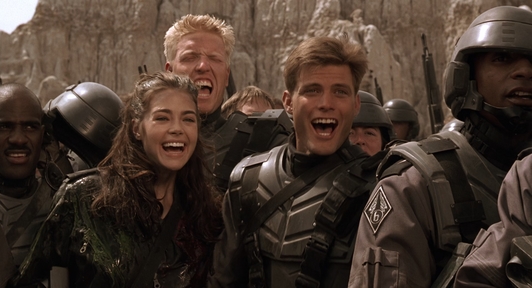On Paul Verhoeven and the present – David Roth in The New Yorker:
‘Where “RoboCop” and “Total Recall” exist in grimy, crowded, dangerous futures that look and feel like degraded versions of the already degrading present, Verhoeven’s bizarre masterwork “Starship Troopers,” from 1997, is set in the more distant days of the twenty-third century—and, it quickly emerges, long after the end of history. “This year, we explored the failure of democracy, how the social scientists brought our world to the brink of chaos,” Rasczak, a history teacher (played by the Verhoeven favorite Michael Ironside), barks at his high-school students in an early scene. “We talked about the veterans and how they took control, and imposed the stability that has lasted for generations since.” Rasczak himself is a disfigured war veteran, as are all of his fellow-teachers, and their job is to steer their students toward enlisting in a galaxy-wide war against a species of giant, lethal bug. In this universe, humankind is divided into “civilians” and “citizens”; only citizens have the right to vote, and citizenship can be won only through “federal service” in the military. “Something given has no value,” Rasczak explains. “When you vote, you are exercising political authority. You are using force. And force, my friends, is violence—the supreme authority from which all other authorities derive.” Daily life in the Federation may be cleaner and brighter than in any of Verhoeven’s other futures, but every ambiguity has been displaced by the certitudes, coercions, and doublespeak of endless, totalizing conflict.
To defend the Federation, some suspiciously adult-looking teens leave behind their comfortable space-bourgeois youth for a chance to earn citizenship and enjoy some adventures killing bugs on a faraway planet. We meet them at the end of their school days in Buenos Aires, and see their arena football games and glossy proms: star wide receiver Johnny (Casper Van Dien) is dating Carmen (Denise Richards), who is interested in the rival football star and rising flyboy Zander (Patrick Muldoon); Dizzy (Dina Meyer), the team’s quarterback, has an unrequited crush on Johnny; Carl (Neil Patrick Harris) is a chipper egghead who might also be psychic. Everyone is beautiful and selfish and mostly awful to each other, both in the thoughtless ways that teen-agers are and because their society is designed to channel them toward awfulness. Each of them will find a way to serve the colonial war: Johnny and Dizzy join the mobile infantry (where a drill sergeant welcomes Dizzy to the unit by pressing his knee into her throat until she falls unconscious); Carmen and Zander win spots in flight school; Carl’s gifts allow him to disappear into military intelligence.
The Federation is, to all appearances, losing the permanent war, and much of “Starship Troopers” is given over to watching the teens as they fight and die for the cause. One of Verhoeven’s main goals is to depict a society whose fixation on force has left it preening, idiotic, and paradoxically weak. This state manifests as endless columns of cultishly revered and supremely well-equipped violence workers who know how to do only one thing, and a culture that exists exclusively to celebrate their efforts. If it’s unsettling to recognize similarities between the crumbling futures of “RoboCop” and “Total Recall” and our own cultural moment, it’s terrifying how familiar the thudding martial beats of “Starship Troopers” are to contemporary ears. It’s a comedy, of course.’
(…)
‘“With a title like Starship Troopers, people were expecting a new Star Wars,” Verhoeven told the Guardian. “They got that, but not really: it stuck in your throat. It said: ‘Here are your heroes and your heroines, but, by the way—they’re fascists.’ ” Verhoeven borrows from Leni Riefenstahl’s Nazi propaganda documentaries “Olympia” and “Triumph of the Will,” not just in individual moments and shots but also in what is exalted and what is left out. The film covers Susan Sontag’s list of the ruling fetishes of Nazism, from her 1975 essay “Fascinating Fascism” (“the cult of beauty, the fetishism of courage, the dissolution of alienation in ecstatic feelings of community; the repudiation of the intellect”), but also slyly plays up what’s missing elsewhere. When Johnny wins a training exercise at boot camp, Verhoeven shows him triumphantly waving a flag in a backlit, low-angle shot, then matches it from another, more distant angle. The first shot is startlingly well-replicated Riefenstahl iconography. The second is just a square-jawed young jock on a platform, yelling.’
(…)
‘Donald Trump didn’t empty American politics of everything but violence; he’s just what was left afterward. He is more an emblem of American defeat than its author. The world of “Starship Troopers” aligns with our moment in its wastefulness and brutality, and most of all in being so helplessly recursive. At the end of the film, the human survivors of the bug siege become the heroes of a bombastic military-recruiting ad. A splash of onscreen text cheers, “They’ll keep fighting . . . and they’ll win!” The second promise is extraneous. All that’s left to win is the chance to fight more, and to fight off the realization that the fighting itself has become the point.’
Read the article here.
It appears to be time to watch “Starship Troopers” – but very much indeed, the fighting itself has become the point.
Culture wars, democracy, religion, name it.
As Ross Douthat wrote a few weeks ago in NYT:
‘The revolutionaries need scapegoats, examples, wrongthinkers to cast out pour encourager les autres, superannuated figures to retire with prejudice. But they aren’t out to dissolve Harvard or break up Google or close The New York Times; they’re out to rule these institutions, with more enlightenment than the old guard but the same fundamental powers.’
Read article here
To rule the institutions with more enlightenment is just another way of saying that the fighting itself is the point.
